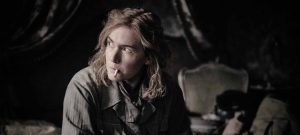WHAT a person Elizabeth ‘Lee’ Miller must have been.
In her 70 years she was a socialite, fashion model, surrealist photographer, war correspondent and gourmet chef, achieving success and notoriety at every turn.
During World War II, she forced her way into being allowed to work on the frontline for Vogue magazine, covering historic events such as the London Blitz, the liberation of Paris and the discovery of the Buchenwald and Dachau concentration camps.
Lee, as she was commonly known, was creative and intellectual, equally free-spirited and determined.
When she set her mind to something, there was no stopping her doing it to the best of her ability and woebetide anyone who got in her way.
She also needed to be challenged and stimulated in every way all the time.
So, with all that in mind, it’s no surprise that actress Kate Winslett became captivated with bringing Lee’s story to the screen.
Lee feaures a full-blooded performance from Winslett in a film that celebrates its subject but doesn’t fully explain her.
It understandably concentrates on the period just prior to the start of the war’s outbreak and then Lee’s brave and resourceful time with the troops in Europe.
The final act of the film, when Lee and one of her colleagues enter the concentration camps , is particularly powerful.
So too is the effort Lee then has to make to get the horrific facts known to as many people as possible, at a time after Hitler had been defeated when many people didn’t want to comprehend the full impact of the Nazi insanity.
We saw the film with friends who knew Lee’s story and believed the film captured her spirit and essence wonderfully.
But, if you don’t know her story, the film is a little disjointed in its depiction of the version of Lee that appears to be a bon vivant enjoying intellectual conversation in the sun and the courageous journalist determined to risk her life to reach the truth.
The failure to adequately portray why, rather than how, Lee makes that leap is the biggest failing of a film that in all other respects is fascinating and thought-provoking.
Maybe a television series was the way to go for such a big personality’s life story.
There is much more to Lee’s story. If you’re interested, read the 1985 biography The Lives of Lee Miller by her son Antony Penrose.
Watched at the cinema.
